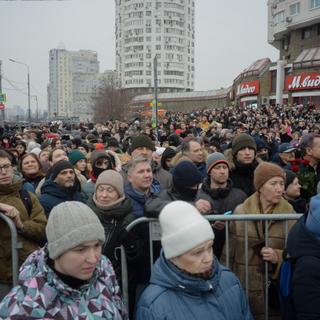


Even in his Moscow grave, Alexei Navalny is treated as an enemy
Long ReadThe brutality displayed by the Russian authorities during the funeral of Navalny, who died in custody, turned the event into a protest: The crowd, denied access to its hero and pushed around by hundreds of police officers in riot gear, finally expressed its rage.
What should be remembered from that day, the silence or the screams? The collected dignity of Alexei Navalny's relatives or the outraged anger of his supporters? There were two funerals for Navalny on Friday, March 1: One for his few remaining relatives in Russia, which almost looked like a standard funeral; the other, messy and enraged, for a crowd of Moscow residents who had lost the man who was their companion and their guide for over a decade. These two events had one factor in common: The total lack of consideration shown by the Russian authorities for either.
In the Church of the Icon of the Mother of God in Marino, a suburb of Moscow where the opposition leader had lived with his family, four chairs had been set out for his parents and those of his widow, Yulia Navalnaya – who was absent, as she lives in exile with the couple's two children. Some fifty other people were admitted into the church, in a haphazard display of Moscow-style police crowd control. All gathered around Navalny's open casket, staring at his grey, deformed face on which had been placed a ventchik, a ribbon adorned with icons and prayers. Navalny, who had died in custody two weeks prior. on February 16, was a man of faith.
The service lasted less than half an hour, far less than is customary – several sources, including within the Orthodox Church, referred to an order to that effect from the Moscow Patriarchate. In the end, the funeral workers went so far as to push past the congregation as they hurried to close the coffin. In the church, anguished cries of "Let us say goodbye to him!" could be heard.
The hearse then sped off with the same haste to the Borissov cemetery, 3 kilometers away, leaving in its wake the crowd of several thousand people, who had been waiting – some since the morning – in a line several hundred meters long, or who stood perched on mounds of snow all around the building.
'A loss comparable to that of a family member'
When a prominent public figure dies, it is customary for the casket to lay open for a time, so anyone who wishes to can pay their respects. Yet Navalny's team was unable to rent a single venue in the capital – the result, they claimed, of pressure – and was not even allowed to be involved in organizing the funeral. The family, too, had wanted "those of you for whom Alexei is dear, for everyone for whom his death became a personal tragedy, to have the possibility to say goodbye to him," in the words of his mother, Lyudmila.
That's why this 69-year-old woman had fought to recover her son's body, when the authorities, after detaining her for twenty-four hours in a morgue in the country's far north, tried to – illegally – convince her to accept a secret burial. "Time's not on your side, bodies decompose," threatened Officer Varapayev, whose name Navalnaya dared to make public.
You have 65.84% of this article left to read. The rest is for subscribers only.
